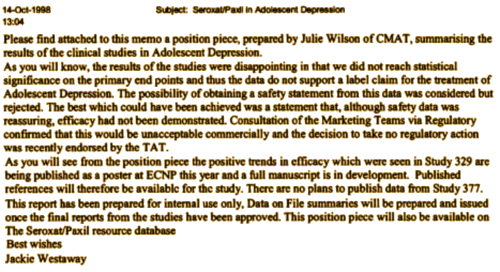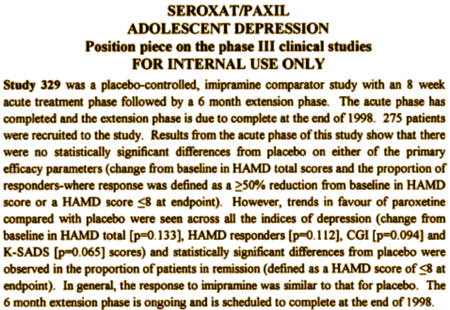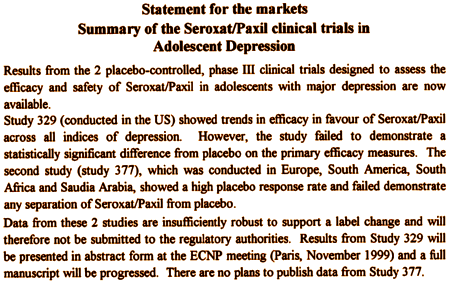GSK Study 329 has become the symbol of the corruption of the psychiatric literature [retract study 329…]. As we all know, The published article concluded, "Paroxetine is generally well tolerated and effective for major depression in adolescents." Among the documents released with the $3B fining of GSK [Biggest Deal Ever: Glaxo Pays $3B For Bad Behavior], there were several memos that made it infinitely clear that GSK knew that it was a negative study:
There have been numerous calls for a retraction of the ghost-written article [published in the Journal of the Academy of Child and Adolescent Psychiatry in 2001] [including my own]. The most recent appeal was to Brown University itself [why not now?…], but it was rejected:
 |
| U. will not support Keller retraction by Sahil Luthra February 3, 2012 |
| The University will not support an effort to retract a controversial study co-authored by Professor of Psychiatry and Human Behavior Martin Keller, wrote Edward Wing, dean of medicine and biological sciences, in a recent letter to the global nonprofit Healthy Skepticism. The study — commonly referred to as Study 329 — identified the drug Paxil as an effective combatant of adolescent depression. Since its publication in 2001, the study has raised concerns due to findings that link Paxil to higher rates of suicidal tendencies. |
| Citing claims that Keller’s study intentionally misrepresented the effectiveness of Paxil by suppressing data, Healthy Skepticism asked the University to write to the Journal of the American Academy of Child and Adolescent Psychiatry and request a retraction of the findings, The Herald reported in November. Jon Jureidini, a co-author of the Healthy Skepticism letters and a professor at the University of Adelaide in Australia, received Wing’s most recent reply on Monday. In an email to The Herald, Jureidini wrote that Healthy Skepticism would not be discouraged by the University’s response, though he added he was unsure how the group would proceed. "One hopes that universities are leaders in moral and scientific integrity, but how can they expect students to acquire such values when their behavior directly contradicts their stated policies?" wrote Healthy Skepticism co-author Leemon McHenry in an email to The Herald. McHenry is also a researcher, lecturer and part-time professor at California State University in Northridge… |
In an unusual mea culpa, Glaxo offered the closest statement to an outright apology that any drugmaker has made to date in response to such allegations. “Today brings to resolution difficult, long-standing matters for GSK,” Glaxo ceo Andrew Witty says in a statement. “Whilst these originate in a different era for the company, they cannot and will not be ignored. On behalf of GSK, I want to express our regret and reiterate that we have learnt from the mistakes that were made.”



Unfortunately, GSK CEO Andrew Witty’s statement resembles the U.S. Department of State expressions of regret to Pakistan before Hilary Clinton finally uttered the magic word ‘sorry’ this week. GSK hasn’t outright admitted on the record that Study 329 was fraudulent.
According to news reports, GSK has only gone this far: GSK expressly denied liability, except for those admissions GSK agreed to make in connection with connection with a criminal Plea Agreement. Specifically, according to the agreement, GSK has agreed to plead guilty to criminal charges that the company misbranded Wellbutrin and Paxil. See here.
By way of follow up, the plea agreement contains no mention of Study 329 or of Martin Keller. All the documents are available here.
It wouldn’t be that difficult to draw the connection between Study 329 and GSK’s recent penalty! How can a noise about this be made in the media?